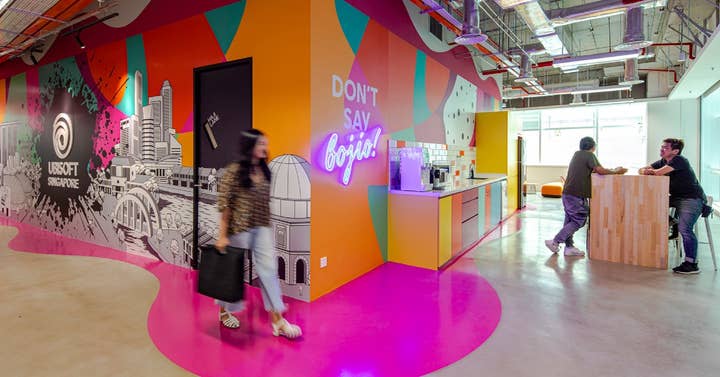Report details toxic culture, sexual harassment and racial pay disparity at Ubisoft Singapore
Sources say things have improved since studio head was removed last year, but many issues still remain
A new report has given another insight into the toxic culture reportedly at play within Ubisoft's development studios, this time concerning its Singapore branch.
Kotaku has published an exposé speaking to more than 20 former and current staff members from the studio, one of whom described Singapore as "one of the worst Ubisoft studios in terms of culture."
Accusations include sexual harassment, bullying by managers and racial pay disparities, with much of the toxicity occuring under the leadership of Hugues Ricour.
Ricour was accused of sexual harassment by multiple people in a Gamasutra report back in August 2020, which came in the wake of the first major wave of allegations against senior Ubisoft staff.
In November, it was reported he had been removed from his role as studio head of Ubisoft Singapore, although his own LinkedIn profile indicates he held the position until February. He remains at Ubisoft, currently in the role of production intelligence director and based at the publisher's Paris HQ.
Kotaku reports he was replaced by Daryl Long, formerly head of Ubisoft Winnipeg, with sources claiming he is an improvement, but alleged pay disparities and other issues are still ongoing.
Created in 2008, the office is primarily a co-development operation that contributes to the likes of Assassin's Creed and Immortals: Fenyx Rising, although it has also been leading work on the long-in-development multiplayer pirate outing Skulls & Bones.
Sources claim the Singapore government gave Ubisoft hefty subsidies in the hopes that the studio would train up local talent who would eventually take over the studio themselves. But while Ubisoft has reportedly taken the subsidies, leadership is still granted to expats rather than local staff -- as demonstrated by the appointment of Long to replace Ricour.
Furthermore, Kotaku's sources report big differences in pay for local staff compared to those who moved to Singapore to work at the studio, with some of the former still having to live with parents due to their low salaries.
The gap is reported as between $5,000 and $10,000 per year in many instances, although there are examples of wider disparities. Some senior managers are reportedly paid significantly more than those at studios like Ubisoft Montreal or Massive Entertainment.
There is also allegedly a "French ceiling" making it harder for anyone not from France or fluent in the language to succeed. This is said to be particularly true for SouthEast Asian employees or women.
The report also suggests an ineffective HR department which, while primarily managed by locals, is forced to follow the priorities of general management and production, according to sources.
It is claimed that sexual harassment incidents are swept under the rug, Kotaku says. One case that led to a formal review resulted in nothing more than a formal warning and mandatory training in cultural sensitivity.
The woman who reported she was being harassed appealed this situation and the man she accused was moved to another building. The whole process took nine months, and sources report the "bro culture" remained, with some staff even mocking the training after they completed it.
You can read the full report at Kotaku.
In a statement to GamesIndustry.biz, a spokesperson said: "We celebrate our international culture at Ubisoft and work to ensure our teams are deeply integrated into the local communities where we operate. We do not and will not tolerate abuse, harassment or discrimination.
"Ubisoft Singapore is proud of the studio culture that has been built over the last thirteen years with 35 nationalities and talent coming from a wide range of backgrounds. 40% of expert and senior expert roles are Singaporean or permanent residents. Our objective is to continue to increase Singaporean leadership through various programs including a dedicated management learning path to accelerate the development of new leaders. Compensation is determined by role, responsibility, market practices and performance."
Reports first emerged of toxicity, misogyny, abuse and sexual harassment at Ubisoft back in July 2020, alongside similar accusations against other notable games companies, such as Insomniac Games.
The company made various changes and personnel appointments in the wake of these accusations, but earlier this year French publication Le Télégramme reported these had made minimal impact. CEO Yves Guillemot disputed this, claiming Ubisoft had made "considerable progress."
Earlier this month, it was reported that Ubisoft's Universal Registration Document had been changed, warning that the company was at high risk of losing talent following the allegations, as well as moderate risk of "inappropriate behaviour by employees."
In an additional statement sent to GamesIndustry.biz, the publisher said: "Over the course of the past year, Ubisoft has implemented significant and meaningful changes that seek to ensure a safe and inclusive work environment for all. These have included trainings and more comprehensive procedures that allow our employees to bring forward concerns and claims, and ensure they are investigated and dealt with in a timely manner.
"It's our hope that through our ongoing actions all team members feel supported, valued and confident in Ubisoft's ability to foster a culture of respect and belonging. For our most recent updates on our company-wide efforts to build a better Ubisoft, you can find a message from our CEO here.
"Ubisoft is a global company, and our offices and studios around the world are made up of diverse groups of people. We have a deep respect for local cultures and strive to create environments where everyone feels welcome and respected."

